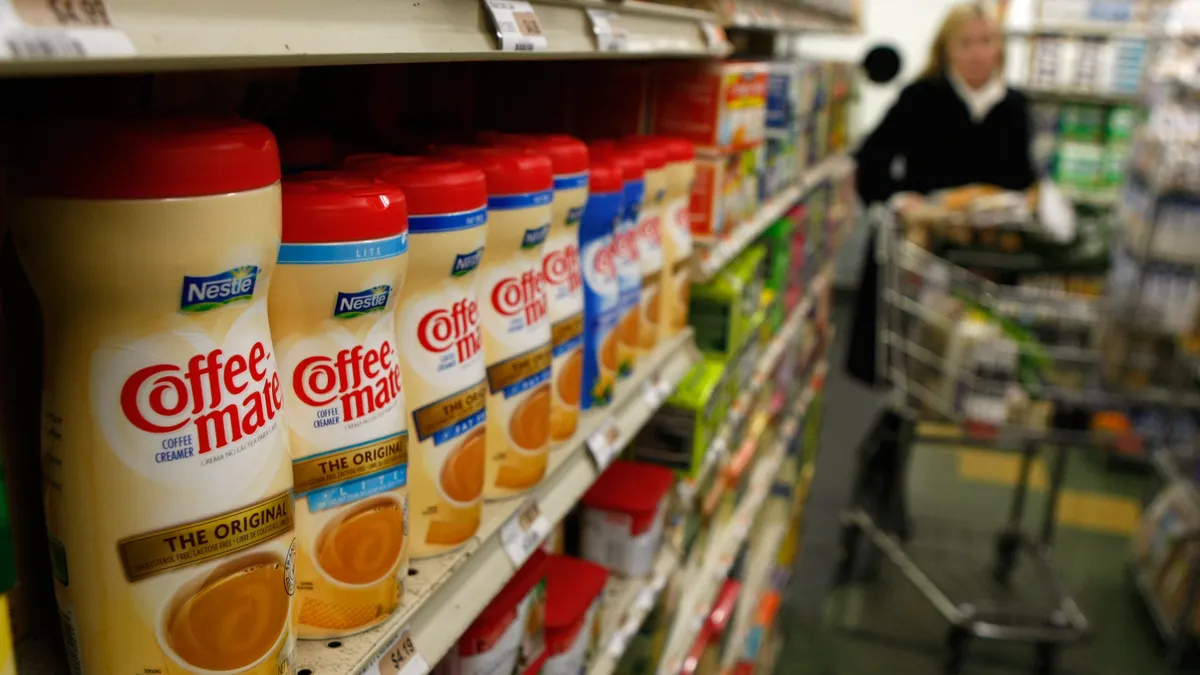Dive Brief:
- Nestlé shareholders voted against a proposal Thursday which asked the company to change its portfolio strategy by cutting its “over-reliance on less healthy foods” containing high amounts of salt, sugar and fats.
- The March 14 proposal, filed by a coalition of Nestlé shareholders through responsible investment NGO ShareAction, asked the global food and beverage company to set targets to increase the proportion of its sales derived from healthier products to “dramatically improve” the company’s impact on public health.
- The proposal was struck down by a large majority of Nestlé shareholders during its annual general meeting on April 18, with 88% of shareholders voting against the proposal, 11% voting in favor of it and 1% abstaining, ShareAction told ESG Dive over email. Prior to the vote, Nestlé said it disagreed with the NGO’s assessment of its portfolio, noting that “people can enjoy indulgent products in moderation, and there is nothing wrong with that,” in a press release.
Dive Insight:
ShareAction’s proposal also called on Nestlé to adopt internationally accepted standards that defined “healthy food” instead of “deviating from credible guidelines.” In the proposal, the coalition of shareholders said over half of Nestlé’s sales did not meet the Health Star Rating healthier threshold of 3.5 or above, developed by Australia and New Zealand’s Food Standards agency, which exposed the company to “regulatory, reputational and legal risks.”
Further, the proposal said Nestlé has included products under its “nutritious” category, such as coffee, infant food and milk formula for young children, despite the HSR not applying to these products nor being recommended by health professionals.
Nestlé — which houses over 2,000 brand names under its umbrella, including baby food products such as Cerelac and Gerber, and coffee labels such Nescafé and Nespresso — said it disagreed with ShareAction’s view that such products should not be included in its portfolio’s nutritious segment. The company said the health benefits of both coffee and specialized nutrition are “recognized externally” and, hence, finds it appropriate to include them.
The Swiss multinational also said it disagreed with the proposal’s ask to set targets to increase the proportion of its sales from healthier products, as it would require the company to dilute other parts of its portfolio. Nestlé said that this, in turn, would create opportunities for competitors without necessarily promising any public health benefits.
Nestlé said ShareAction was “targeting the wrong company” with its proposal, as it was already making headwinds with its health and nutrition-related goals, as compared to other food manufacturers.
Following the vote’s result, ShareAction’s Deputy Chief Executive Simon Rawson said that while Thursday’s outcome was less than what the group wanted, he hoped the proposal encouraged shareholders to think about the public health impacts of their investments.
“Investors and consumers are recognising the importance of addressing the business risks and public health impacts of an industry that is heavily reliant on the sales of unhealthy food,” he said in an emailed statement. “They have growing expectations not only from Nestlé but from all food manufacturers.”










